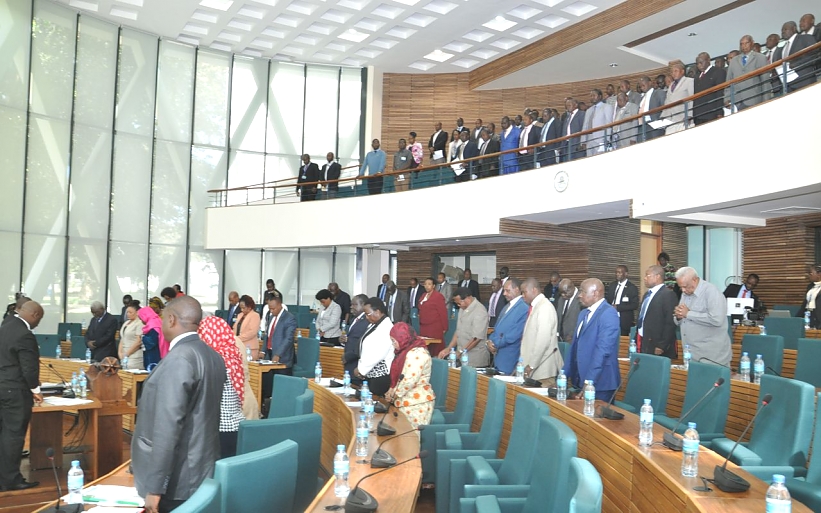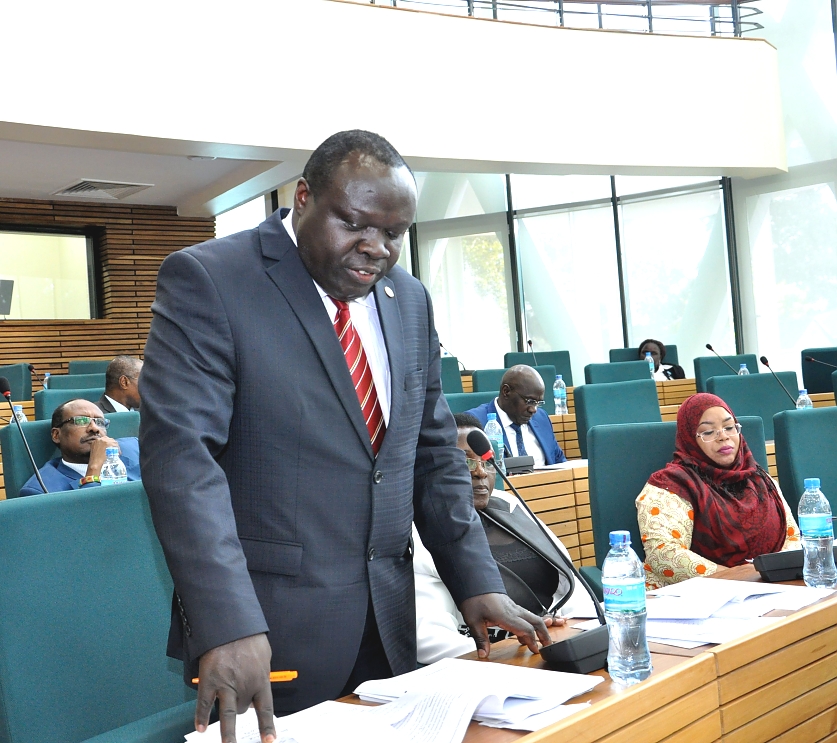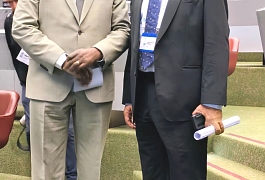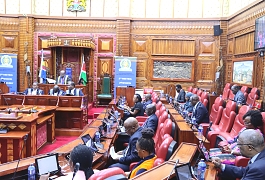Assembly passes key report on poaching, urges governments to reform laws, get tough on those plundering wildlife resources
East African Legislative Assembly, Arusha, Tanzania: 23 August, 2016: The East African Legislative Assembly resumed its session in Arusha, Tanzania, today, where it debated and passed a critical report on poaching in the region.
The Assembly in essence, urged EAC Partner States to reform wildlife laws and to put in place initiatives that promote upkeep of communities that neighbor the wildlife conservancy areas.
The Oversight report on poaching presented to the House by the Chair of the Agriculture, Tourism and Natural Resources Committee, Hon Christophe Bazivamo, further urges Partner States to develop/improve wildlife conservation strategies and protection measures through patrols, joint cross border operations, surveillance and information sharing.
With it, the Assembly says Partner States should and can provide part of the revenue collected from wildlife tourism to the communities living around the National Parks to promote conservation.
The report emanates from a workshop on poaching and fisheries held in Mwanza, Tanzania and in Nairobi, Kenya in August 2014. Its objective was to sensitize Parliamentarians on the escalating problem of poaching and illegal wildlife trafficking in EAC region and to solicit their views on strategies and measures that could be adopted in addressing the problem. The workshop further sought to consider existing international and regional policies, strategies and regulatory framework/instruments on wildlife management on the one side as well as the current and proposed national and regional initiatives toward strengthening wildlife conservation on the other hand.
The report was a follow –up on the Resolution moved in the House by Hon. Ogle Abubakar on “Escalating problem on Poaching and Illegal Wildlife trafficking in EAC” in August 2013 in Arusha.
The Committee was only able to visit the Serengeti National Park and the Mwaloni Kirumba fish market in Mwanza, Tanzania as well as the Nairobi National Park.
The Serengeti National Park is dubbed as one of the park’s with the greatest concentration of game in the region and famed for over two million wildebeest, half a million Thomson's gazelles and a quarter of a million, zebras. The Committee observed that mining settlements are interfering with the migration path of some animals and mechanized agriculture has taken over where wildebeests would historically breed their calves.
This has caused a loss of habitat for many species in the Serengeti. At the same time, Hon Bazivamo informed the House that non-authorized people enter into Serengeti National Park for various reasons. Such include poaching, hunting, cutting trees/firewood, grazing, fishing, cultivation and mining. Persons also traverse the parks collecting grass, medicine, honey, water and seeking refuge.
In Kenya, the Assembly was informed that proliferation of small arms and light weapons created an avenue for wildlife poaching. Other documented challenges include inadequate man power (rangers), skills, equipment and transport as well as human settlement around key rhino and elephants’ areas.
The Report also highlights findings of the fishing sector following a visit to the Mwaloni-Kirumba fish market in Mwanza as well as a presentation by experts on fisheries on the Lake Victoria. It states in part that the increasing number of fishermen to 1.5% between 2012 to 2014 means the sector is in danger of collapse in the future.
“Usually, any natural water points (such as lakes, rivers) have a maximum number of fishing effort it can accommodate so that the fisheries become sustainable, above which the fisheries become depleted, unsustainable and will eventually collapse”, a section of the report says.
The report also informs the House of decrease of the use of long-line hooks as well as the use of prohibited illegal gillnet as challenges despite its decrease in usage by 7.2%.
During debate today, Hon Martin Ngoga said Police in Rwanda recently intercepted ivory cargo transiting through the country and said further deficiencies in legislation on matters of poaching need to be effectively handled.
“We have to look into the shortcomings on legislations with a view to coming up with regional piece of legislation or strengthening those of Partner States,” the legislator said.
Hon Ngoga remarked that there was abundance of political will in resolving the poaching impasse but said such capacities need to be strengthened.
Hon Taslima Twaha said the water hyacinth continued to be a challenge in Tanzania saying it was depriving fish of existence.
“The technology that was used in the Republic of Kenya in Kisumu could be shared in Mwanza to address the problem”, Hon Twaha said.
He said fish and specifically the nile perch was good for health of all citizens and that it was vital for the demands of the region to be fully met before any exports.
Hon AbuBakr Ogle said the Middle East and specifically China was a big beneficiary of poaching menace and it was necessary for the Government and the EAC to partner together to end the vice.
Hon Shyrose Bhanji said the fish market provided labour opportunities for those in the fishing business. She remarked that the Serengeti national park which straddles Arusha, Manyara and Mwanza which had a rich ecosystem for a number of years was now deprived and pegged at 30%.
“The Park needs to be preserved and mining activities should be suspended and stiff penalties meted to poachers. Our governments must come together to fight the malpractices” she said.
Hon Isabelle Ndahayo said corruption was a key ingredient of poaching and the region needs to stem the vice.
“We have debated the matters over and over again, passed a number of resolutions. The conservation areas are shared and a joint strategy is necessary. The Council of Ministers must deal with the matter squarely”, Hon Ndahayo said.
Hon Nusura Tiperu said the adoption of the report was a key indication that the Assembly is passionate about ending poaching.
“Governments must be tough and act to save those working to deplete numbers. Animals have no borders and laws that are defined within national borders may not suffice. Instead a regional mechanism is key” Hon Tiperu said.
Hon Maryam Ussi, Hon Pierre Celestin Rwigema, Hon Dr Odette Nyiramilimo, Hon Patricia Hajabakiga also supported the report.
Third Deputy Prime Minister and Minister for EAC, Republic of Uganda, Rt Hon Kirunda Kivejinja said a regional mechanism was necessary to contain poaching.
Kenya, United Republic of Tanzania and Uganda are beneficiaries of the Ivory Fund whose contributors include; Netherlands, Germany, China, UK, France Belgium and South Africa. Kenya and Tanzania have been identified to be among the eight countries of concern with respect to increased illegal trade in elephant ivory and directed by the Convention on International Trade on Endangered Species (CITES) Parties through the Standing Committee to put in place actions aimed at reducing the illegal trade.
-Ends-
__________________________
For more Information, contact:
Bobi Odiko, Senior Public Relations Officer,
East African Legislative Assembly,
Tel: +255-27-2508240, Cell: +255 787 870945 +254-733-718036;
Email: bodiko@eachq.org,
Arusha, Tanzania,
www.eala.org


_837_556shar-50brig-20.jpg)



_265_180shar-50brig-20_c1.jpeg)